Decaf coffee

About Black Crow White Pigeon Coffee
Ever wondered what stories a cup of coffee could tell you? Black Crow White Pigeon, one of Coffee Friend’s own coffee lines, is all about the stories behind extraordinary specialty coffees. The Black Crow and the White Pigeon are the main characters of this tale, ready to take you on a journey leading from dark, deep, earthy notes all the way to light, subtle aromas. Each coffee in this range is assigned its own chapter, numbered from 1 to 24. Feel free to start your adventure from any chapter, and see where it takes you! The best part is, you get to be the hero of this story. Your chosen brewing method decides what kind of flavours you’ll taste, and that’s what makes each cup of coffee different.Black Crow White Pigeon Specialty Coffee
Coffee is the daily companion of millions of people worldwide, which is why every Coffee Friend coffee is designed to pair perfectly with your daily routine. Caprisette takes you on a milder journey, Parallel offers clear and defined flavours... However, if you’re craving something new and exciting, Black Crow White Pigeon is undoubtedly the ideal choice. Whether you’re new to coffee or are already a seasoned expert, you can rely on this range to produce brews of the highest quality. Black Crow White Pigeon is built on specialty arabica coffee beans, never blended with other varieties in order to showcase the distinct character of each coffee. For the best flavour experience, we recommend savouring each cup au naturel, without any additional ingredients. You’ll find that specialty coffee makes up just 10% of the entire coffee produced worldwide. It’s assessed based on a strict scale designed by the Specialty Coffee Association. Every variety in the Black Crow White Pigeon line boasts a score ranging from 80 to 88. A score like that is high praise indeed: in the realm of specialty varieties, coffee that gets anywhere from 85 to 88 points is considered to be excellent, while varieties with a score of 80 to 84.99 are categorised as very good. Basically, the higher the score, the more impressive and intriguing the flavour! If you want to discover the unique flavours of different countries and coffee varieties, Black Crow White Pigeon has got you covered! This range includes a variety of coffee beans and ground coffees designed to suit every taste. Each coffee boasts its own extraordinary story: from the moment the coffee tree’s been planted to the moment you take a sip.What Makes Black Crow White Pigeon Coffees Special?
All coffees in the Black Crow White Pigeon range are lovingly cultivated in extraordinary settings and amongst one-of-a-kind conditions. Their flavour and overall quality are decided by the soil and the microclimate. Plus, these varieties are grown at the top of the world—that is to say, in the highlands of different countries, where the ripening process is slower and lets the flavours develop more complexity. While each Black Crow White Pigeon coffee is its own distinct experience, keep in mind that coffees from a specific region or continent tend to share certain flavours in common:African coffee. A true haven for coffee connoisseurs, Ethiopia, Uganda, and Marcala are the epicentres of exceptional coffee. The Black Crow White Pigeon varieties grown in these countries are a unique delight. Their flavour profile is a mix of fruity, floral, tea- or wine-like notes, topped off with a juicy finish.
Asian coffee has been gaining popularity lately, and the coffee market in countries like Myanmar and Vietnam has been growing steadily for the past few years, with growers in this region shifting their focus towards premium-quality coffee. Asian coffee beans are known for their distinct flavours, which are often described as bitter and include notes of spices, chocolate, tobacco, red wine, and wood.
South American coffee. These coffees are a great place to start your specialty coffee journey! If you’re new to this world, we recommend exploring Brazilian or Colombian varieties first. You’ll love the balanced flavour, natural sweetness, and delicious hints of chocolate, nuts, and fruit. South American coffees are generally less acidic than African ones, and milder than Asian varieties.
Central American coffee is a real treat! From Guatemala to Nicaragua, these countries produce a diverse range of flavours: from tropical fruit to nuts. What all Central American coffees have in common though is their unique taste profile and distinct character.
Set out on a journey around the world without leaving your sofa by giving our medium-roasted Black Crow White Pigeon coffee set a try! It features several different varieties that showcase the unique traditions and flavours of Nicaragua, Brazil, and Ethiopia. With these high-quality arabica beans, each cuppa is bound to be a delight. When developing this line, we’ve also considered those who can’t or don’t want to consume caffeine. If you’re one of them, you can enjoy specialty coffee too! Black Crow White Pigeon Colombia Decaf is an excellent alternative to regular coffee. It’ll let you savour amazing specialty coffee flavours without the jitters associated with caffeine.How to Choose the Right Black Crow White Pigeon Coffee for You?
In the journey of specialty coffee, an important role is played by the person who brews and tastes the final drink. For Black Crow White Pigeon coffees to bring out their finest qualities, the right roasting, processing and brewing methods must be selected.Roast Level
In the world of coffee, there are many different ways to brew your drink, and each of them lets different flavours shine through. Two of the most popular brewing methods are espresso and filter. While both of them can be used for coffees from the Black Crow White Pigeon line, the roast level must still be considered when searching for the right coffee for you. For those who love the strong taste of espresso coffee, specialty varieties can offer an even richer, more intense flavour, with unique aromas and notes that would be hard to obtain using coffee of a lower quality. If you enjoy bold flavours and prefer coffee without any extra ingredients, choose a medium to dark roast for your espressos. Filter coffee brings out the subtlest notes hidden in the beans, and boasts a buttery, silky body, as well as a clean cup. Go for light roasts to get the most out of your specialty filter brews.Processing Method
When looking for the right coffee for you, the processing method is another important characteristic to consider. It has a huge impact on the final taste and body of your brew. The natural process endows beans with a richer, sweeter taste, and a fuller body. The washed process is known for clean, mild flavours, a light body, and pronounced notes of fruit. The honey process crafts a medium body and sweet notes of fruit or tea, while anaerobically processed coffee is particularly fruity and boasts unique, exotic notes.Brewing Method
Another criterion should be your preferred brewing method. It can bring out different qualities of your coffee, providing you with a variety of flavour experiences. Light-roasted coffees are perfect for in-cup brewing or filter brewing methods like a filter coffee machine, a French press, a Chemex, an AeroPress, or even a cold brew coffee maker. While these brewing tools may differ, the outcome is always a quick cup of coffee marked by deep flavours and strong aromas. Coffee beans of a medium to darker roast are perfect for bean-to-cup machines, espresso machines, and moka pots. When brewed in these appliances, specialty coffee may be marked by acidity, yet this is not the kind of acidity that should be avoided. Only coffees of the highest quality boast acidic notes like that, described as sweet and reminiscent of wine or tropical fruit.Black or White?
Take a look at the range of flavours in this coffee line: as you can see, it’s incredibly diverse. Before you buy a certain coffee though, consider its packaging. Fruity, floral, berryish coffees come in a white bag, while earthy, chocolatey ones are paired with the colour black. The numbers on the packaging (1, 2, 3... 24) serve a dual purpose: on the one hand, they’re like chapters in a book, and on the other, they help you remember your favourite coffee so that you can grab the same one next time.Need Advice?
If you can’t find the right variety for you amongst our Black Crow White Pigeon coffees, you can try and browse through other coffee types and ranges. Or If you want to learn more about specialty coffee take a look at our blog post Specialty Coffee: Delve Into Extraordinary Coffee Stories. Also feel free to contact us by phone or email for some tips, by the way—our consultants are here to help!About Caprisette Coffee
Here’s how you discover your favourite coffee flavour: have you tried the Caprisette range of coffees, already loved by millions? Produced by us here at Coffee Friend, this line is super popular and, once you taste it, you’ll know why! Whether you’re after a rich espresso or a creamy latte, these one-of-a-kind coffees are roasted just right for all of your favourite recipes. Join the millions who have already fallen in love—we’re confident you will too!Caprisette Coffee Blends
So, how do you obtain the perfect cup of coffee? We think it’s all about experimenting, and Coffee Friend coffee lines are suited perfectly for that! The Black Crow White Pigeon specialty coffees let you try out different flavour profiles, the Parallel blends promise premium quality... And then there’s the Caprisette line, which offers versatile flavours that are just right for your daily cuppa. Plus, these coffees pair well with bean-to-cup machines, as well as in-cup brewing, French presses, moka pots, and filter coffee machines (just not manual filter brewing tools though). The Caprisette range offers a variety of unique flavours. For fans of milk, there’s “Crema”, which has been a huge hit ever since its introduction. For those who prefer their coffee naturally sweet, there’s “Dolce Vita”. Those who want to enjoy their coffee without the jitters associated with caffeine are bound to love the decaffeinated “Lullaby Decaf”. You can also give “Fragrante” and “Belgique” blends a try: “Fragrante’, the first blend in the line, has been a favourite for a long time thanks to its Brazilian notes of chocolate and nuts. Roasted in Belgium, “Belgique” has also been very successful. All Caprisette blends are available in the form of coffee beans. Those who don’t have a coffee grinder at home, or who want to speed up the brewing process, will be glad to find out there’s ground coffee on offer too. Or perhaps you use coffee pods at home? We have a solution for you as well: there are pods for Nespresso machines in the Caprisette range.Why Choose Caprisette?
Why is Caprisette loved by millions? The answer’s simple: this line combines quality and great taste. Each bean is roasted in the best European roasteries, guaranteeing maximum freshness. There’s a reason why this line has earned so many rave reviews and five-star ratings from you!Highest quality standards. From farm to cup, skilled professionals work hard to guarantee the best possible quality. Coffee farmers carefully harvest, process, and sort the beans, while roasters use their expertise to unlock the unique characteristics of each coffee and deliver a one-of-a-kind flavour.
Roasted in some of the finest roasteries. The beans are roasted in the best European roasteries located in Italy, Belgium, the Netherlands, and Lithuania. Each country contributes its own unique traditions and flavour profiles.
Freshness. We roast our Caprisette beans in small batches to keep them super fresh. This way, we can control every step of the roasting process. The result? Each cuppa is not only fresh, but also packed with subtle, natural flavours that only come about when your coffee is roasted just right.
Suited for all coffee recipes and brewing methods. Caprisette tastes amazing whether enjoyed black or mixed with your favourite milk or other add-ons. We’ve chosen the best coffee varieties and adjusted the roasting process to make sure your coffee tastes great when brewed using not only a bean-to-cup machine, but also a filter machine, a French press, a moka pot, or pretty much any other brewing tool.
Which One Should You Go For?
In the Caprisette range, you’ll find nine blends made up of beans roasted to different levels. What would this normally mean, you wonder? Well, dark-roasted beans are usually designed for intense espresso coffee, while medium- or light-roasted beans produce delicious, delicate filter coffee. However, as we’ve mentioned already, this range is roasted in a way that makes it suit all brewing methods.“Caprisette Fragrante”
A blend of Brazilian beans of a medium-dark roast (80% arabica and 20% robusta) that will appeal to fans of traditional coffee flavours. The aroma boasts a hint of peanut butter, while the taste is marked by notes of milk chocolate. A subtle walnut aftertaste lingers on your palate for a while after the drink is finished.
“Caprisette Belgique”
A blend of Brazilian and Honduran coffees (80% arabica and 20% robusta) bound to please lovers of traditional flavours. It boasts a medium-light roast, an intense aroma, and a full body. There’s a lingering aftertaste of dark chocolate and sweet caramel.
“Caprisette Crema”
This blend of Brazilian and Ugandan coffees combines arabica (80%) and robusta (20%) beans of a medium roast. Enjoy notes of caramel, bitter dark chocolate, and delicious nuts in each sip. Ideal for cappuccinos or lattes. Adding milk isn’t necessary though: the sweet notes of this variety come through in a cup of black coffee too.
“Caprisette Royale”
This blend of Brazilian, Mexican, Ugandan, and Indian coffees combines arabica (80%) and robusta (20%) beans of a medium roast. The rich sweetness of chocolate, hints of dried fruit, and light notes of berries make for a unique taste experience.
“Caprisette Italiano”
Reaching you straight from an Italian roastery, this coffee is a 100% arabica blend of Brazilian, Mexican, Indian, and Ethiopian coffees, all carefully handpicked and medium-roasted. It’s a real treat for the senses, with notes of sweet caramel, gourmet liqueur, and rich cacao.
“Caprisette Dolce Vita”
We’ve handpicked the sweetest Brazilian coffee beans, and selected a medium roast for them to make their natural sweetness stand out even more. Sipping on this 100% arabica will enable you to experience notes of milk chocolate, caramel, and almonds.
“Caprisette Professional”
This blend of Brazilian and Honduran 100% arabica beans is perfect for those who enjoy subtle flavours. Marked by a medium-light roast, it boasts sweet aromas of berries and caramel, combined with subtle hints of dark chocolate.
“Caprisette Intenso”
This medium-roasted blend of Brazilian and Vietnamese coffees is a mix of arabica (45%) and robusta (as many as 55%!) beans, guaranteed to provide that much-needed burst of energy. Plus, it’s super tasty, with hints of dark chocolate, roasted nuts, and a spicy kick that will leave you wanting more.
“Caprisette Lullaby Decaf”
This decaf coffee of a medium-dark roast combines the finest arabica and robusta beans from Brazil, Guatemala, and India. It offers a particularly smooth flavour, with notes of cashews, cacao, and wood.
Struggling to make your choice? Why not give coffee sets a try, and discover a bunch of Caprisette flavours at once? We’ve also got sets that come in gift boxes, beautifully packaged for any occasion.Got Questions? We’ve Got Answers!
Interested in other types of coffee? Coffee Friend’s team is here to guide you towards your perfect cup. Reach out to us by email or phone.-
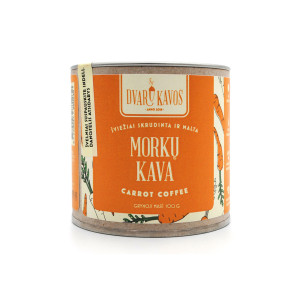
Carrot coffee Dvaro Kavos, 100 g
£5.52 -20%£6.90 -
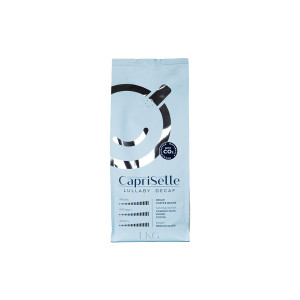 3.0Rated 3.00 out of 5(2)
3.0Rated 3.00 out of 5(2)Decaf coffee beans Caprisette Lullaby Decaf, 1 kg
£24.99 -
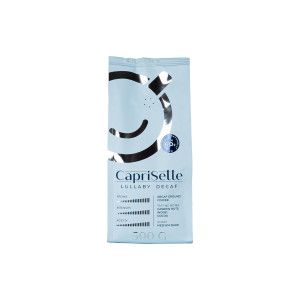
Decaf ground coffee Caprisette Lullaby Decaf, 500 g
£13.99 -
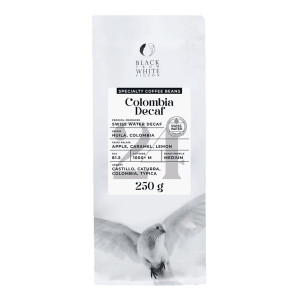
Specialty decaf coffee beans Black Crow White Pigeon Colombia Decaf, 250 g
£11.13 -30%£15.90 -
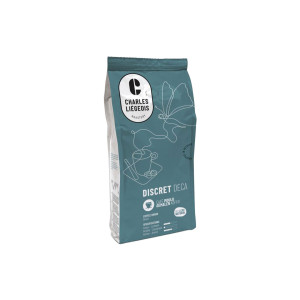
Decaf ground coffee Charles Liégeois Discret Déca, 250 g
£12.59 -
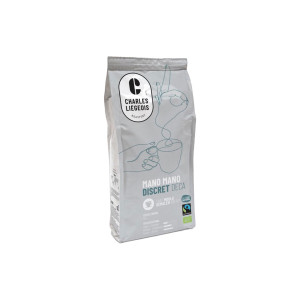
Ground decaffeinated coffee Charles Liégeois Mano Mano Discret Déca, 250 g
£10.90 -16%£12.90 -
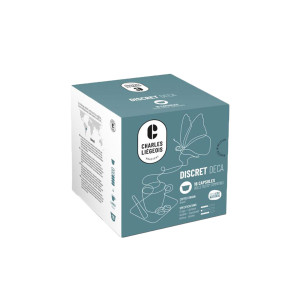
Coffee capsules compatible with NESCAFÉ® Dolce Gusto® Charles Liégeois Discret Deca, 16 pcs.
£7.99 -
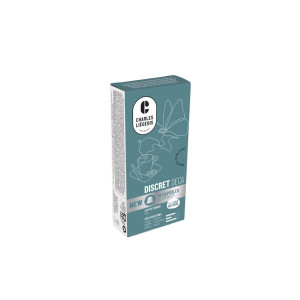
Decaf coffee capsules compatible with Nespresso® Charles Liégeois Discret Deca, 10 pcs.
£4.99 -29%£6.99 -
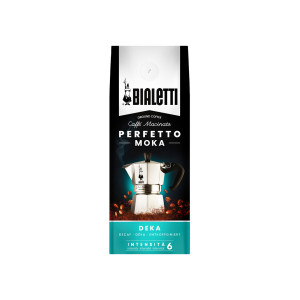
Decaf ground coffee Bialetti Perfetto Moka Decaf, 250 g
£4.47 -20%£5.59 -
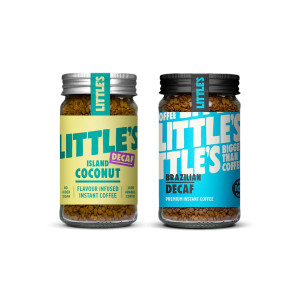
Instant coffee set Little’s Brazil Decaf x Island Coconut, 2 x 50 g
£12.99 -
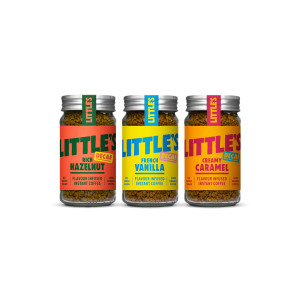
Decaf flavoured instant coffee set Little’s French Vanilla x Creamy Caramel x Rich Hazelnut, 3 x 50 g
£12.99 -
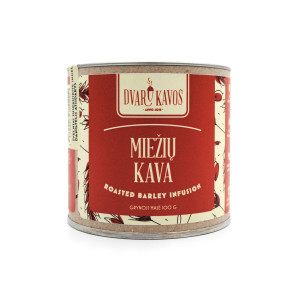
Barley coffee Dvaro Kavos, 100 g
£3.92 -20%£4.90 -
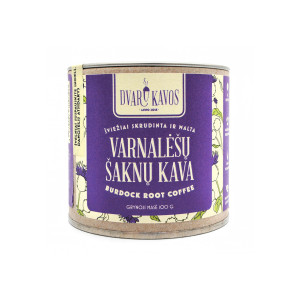
Burdock root coffee Dvaro Kavos, 100 g
£5.52 -20%£6.90 -
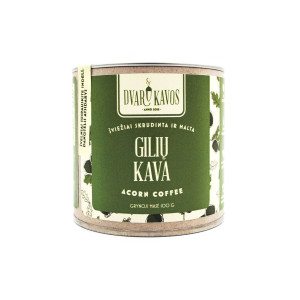
Acorn coffee Dvaro Kavos, 100 g
£5.50 -
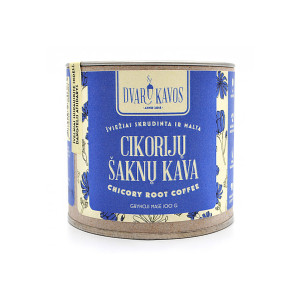
Chicory root coffee Dvaro Kavos, 100 g
£4.72 -20%£5.90 -

Dandelion root coffee Dvaro Kavos, 100 g
£6.32 -20%£7.90 -
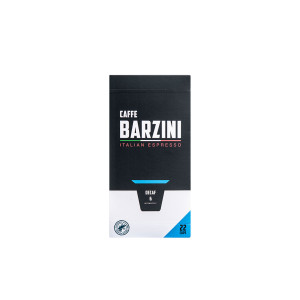
Decaf coffee capsules compatible with Nespresso® Caffe Barzini Decaf, 22 pcs.
£5.24 -30%£7.49 -
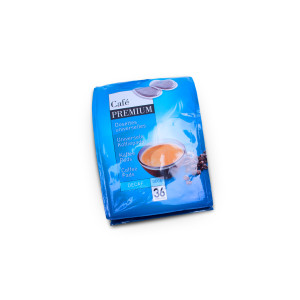
Decaf coffee pads Coffee Premium Decaf, 36 pcs.
£8.49 -
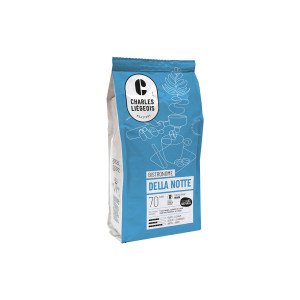
Decaf coffee beans Charles Liégeois Della Notte, 500 g
-
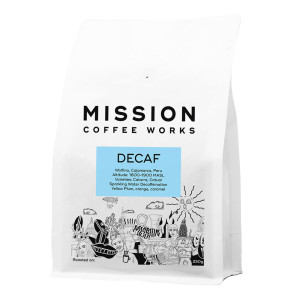
Decaf coffee beans Mission Coffee Works Decaf, 1 kg
About decaffeinated coffee
Decaffeinated coffee is another type of coffee that is rapidly gaining popularity around the world. Decaffeination does not mean that the coffee will have a poor taste. In fact, decaffeinated coffee can be a pleasant surprise, with its strong aromas and flavours. As a result, the number of people choosing decaffeinated coffee is growing daily. This includes coffee lovers who limit their caffeine intake for a variety of reasons, pregnant and breastfeeding women, people with caffeine sensitivity and those who tend to exceed their daily caffeine intake but still want to enjoy the taste of coffee.
Whatever your reasons for being interested in decaffeinated coffee, the Coffee Friend assortment offers the highest quality decaffeinated products in familiar and popular forms, from coffee beans to capsules, tablets and pods. Decaffeinated coffee has endless variations to suit different preparation methods, needs and tastes.
Decaffeinated coffee beans
Those who want to fully enjoy their coffee drink know that decaffeinated coffee beans are the ones with the great aroma and flavour potential. But how do you choose the best decaffeinated coffee beans? First of all, we recommend choosing coffee beans from which the caffeine has been safely removed, preserving all the essential flavours. The Coffee Friend’s assortment contains only products that have been decaffeinated using completely safe methods. The best evaluated natural methods of decaffeination are the carbon dioxide (CO2) or Swiss Water Process methods. By removing the caffeine in these ways, the most valuable qualities of the beans are preserved, making decaffeinated coffee rich in flavour and aroma.
It is also important to consider the roasting level of the beans. Decaffeinated coffee beans, like regular beans, are available in light, medium and dark roasts. What does the level of roasting indicate about the taste of the coffee? Light roast coffee beans retain the natural flavour of the coffee, and you’ll get more pleasant acidity and fruitiness in your cup. Decaffeinated medium-roast coffee beans give the sweetest flavours to coffee, making them one of the most popular among both black coffee and milky coffee lovers. Decaffeinated dark roast coffee beans are the choice of fans of strong, rather bitter coffee.
The decaffeinated coffee that has been top rated by our customers is Colombia Decaf Excelso, a Colombia specialty coffee bean. They are grown in Colombia’s famous Huila region and treated with the highly regarded Swiss Water Process®. This coffee has been awarded the Specialty label for its exceptional quality and taste. The notes of chocolate and caramel emerge in this coffee, accompanied by fresh apple and citrus acidity. Another popular high quality decaffeinated coffee bean is Della Notte from our long-standing partners, Belgian roasters Charles Liégeois. This full-bodied Brazilian coffee has notes of nuts and cocoa with subtle hints of red fruit. The caffeine in these beans has been removed naturally using the CO2 method. For those who like mild coffee flavours, we’ve created the first decaffeinated coffee in the popular Caprisette coffee line, Lullaby Decaf. It has sweet notes of cashew nuts, subtle hints of cocoa and wood, and intoxicating aromas that creates a highly pleasurable coffee drinking experience. The caffeine in these coffee beans has been removed using the CO2 method.
Decaffeinated filter coffee
Do you like the mild and delicate taste of coffee but want to avoid the effects of caffeine? Decaffeinated filter coffee retains all the benefits of coffee. It has a less intense flavour than espresso or other coffee beverages prepared using other brewing methods, and reveals more aromas thanks to its unique preparation method, which allows the water to flow through the coffee layer for a longer time. To make the perfect decaffeinated filter coffee, it is important to choose quality beans that have been properly processed so that they retain their flavour characteristics even after the caffeine is removed. It is generally recommended to choose medium or lighter roast ground coffee or beans, which help to retain the original flavour with a pleasant sweetness and light fruitiness.
For those who don’t want to spend a lot of time looking for a high quality coffee, but appreciate mild and delicate coffee flavours, we recommend trying the above mentioned Lullaby Decaf from the Coffee Friend Caprisette line. This coffee has sweet notes of cashew nuts, subtle hints of cocoa and wood, and an intoxicating aroma that creates a highly pleasurable coffee drinking experience. The caffeine in these coffee beans is removed using CO2, preserving the coffee’s natural flavour and aroma.
Decaffeinated espresso coffee
In the world of coffee, espresso refers to both the type of coffee drink itself and the method of preparation. Espresso and espresso-based coffee drinks require coffee machines with a pressure of at least 9 bar. Any espresso coffee, including decaffeinated coffee, can be prepared with this type of coffee machine. When choosing decaffeinated coffee beans for espresso, make sure they are suitable for this type of coffee – this is usually indicated by the word “espresso” on the packaging or description. We also recommend choosing medium or darker roast decaffeinated coffee beans, as these are the base for a rich and flavoursome espresso coffee drink. In order to enjoy the perfect decaffeinated espresso, we recommend coffee beans that have been decaffeinated using the Swiss Water Process. This delicate and environmentally friendly method is used to remove the caffeine only from the finest quality beans with outstanding flavour characteristics.
The Coffee Friend’s assortment offers the highest quality decaffeinated Black Crow White Pigeon “Colombia Decaf” coffee beans, which are perfect for the espresso brewing process. The caffeine has been removed from these beans using the Swiss Water Process, resulting in maximum preservation of the aromatic and flavour qualities that will be revealed in your flavoursome and delicious decaffeinated cup of espresso coffee.
Decaffeinated specialty coffee
In terms of the best decaffeinated coffee, it would undoubtedly be a specialty coffee. First of all, specialty coffee reveals unique flavours as it is single origin and is not mixed with other coffees. Thus, you can perceive very distinct, individual flavours that you won’t find in any other cup of coffee. Moreover, we have mentioned that the Swiss Water Process, which is recognised as one of the best in the world, removes the caffeine from specialty coffees, using no chemicals, only pure water, preserving the most valuable flavour and aromatic qualities of coffee.
We recommend Black Crow White Pigeon’s “Colombia Decaf” for a special taste of decaffeinated specialty coffee. Originating from the Huila region of Colombia, the beans reveal a palette of highly pleasing flavours – chocolate, caramel, fresh apple and citrus acidity – that create an immersive experience of flavours and aromas.
Decaffeinated coffee pods, pads, capsules
Coffee pods are one of the most popular coffee products as they allow you to quickly and easily prepare a delicious and aromatic cup of coffee. Therefore, those who drink coffee prepared in capsule machines should be happy to know that decaffeinated coffee pods are becoming increasingly popular and widely available. The popular Charles Liégeois Discret Deca is also available in pod form: the Charles Liégeois Discret Deca pods for Dolce Gusto® machines and the Charles Liégeois Discret Deca pods for Nespresso coffee machines.
Those who use a pod coffee machine at home will also find a choice in the Coffee Friend’s assortment. The Decaf Premium Coffee is our special offer for you. These decaf coffee pods are decaffeinated and exceptionally aromatic. But what about the taste? This is a mild-tasting, light coffee. The caffeine in these coffee pods has been removed using the highly acclaimed CO2 method, which results in mild coffee flavours and is considered environmentally friendly.
Decaffeinated coffee pods for Dolce Gusto® coffee machines
The coffee pods for Dolce Gusto® machines are distinguished by their intense aromas and highly harmonised flavours. One of them is Charles Liégeois’ Discret Deca decaffeinated coffee pods. The base of this coffee blend is Brazilian coffee. Brazil is the historic birthplace of South American coffee and one of the world’s top coffee- growing countries; the Brazilian coffee is well known for its unique and exceptionally balanced flavour profile. Charles Liégeois Discret Deca decaffeinated coffee strikes the perfect balance between sweetness and bitterness, with subtle notes of spice and roasted flakes, which are particularly satisfying for lovers of the traditional coffee taste.
Decaffeinated coffee pods for Nespresso coffee machines
The Coffee Friend assortment also includes decaffeinated coffee pods for Nespresso machines. The Italian decaffeinated coffee pods by Cafe Barzini “Decaf” are a medium-bodied, amazingly creamy, red fruit and cocoa flavoured coffee drink. For unique, intense flavours, we recommend Charles Liégeois “Discret Deca” decaffeinated coffee pods originating from exotic Peru. We also offer organic decaffeinated coffee pods from Charles Liégeois “Mano Mano Discret Deca”, rich in flavours and aromas and produced completely naturally. The caffeine from all Nespresso coffee pods in the Coffee Friend assortment has been removed using only natural methods, without the use of dangerous chemical solvents, and is therefore a safe and, of course, delicious choice.
Decaffeinated coffee tablets
We recommend decaffeinated coffee tablets for those who use semi-automatic espresso machines and do not always have time to grind fresh beans. We only offer the highest quality coffee tablets, which have been decaffeinated using safe and proven methods, preserving the best flavour and aroma. Also, our constant emphasis is on catering for all decaffeinated coffee lovers, so there’s a range of fresh, sweet and strong flavours to satisfy your tastes.
Decaffeinated ground coffee
The Belgian Discret Deca from Charles Liégeois is Coffee Friend’s most popular decaffeinated ground coffee. With an intense aroma and a very well-balanced taste, this coffee will appeal to those who love traditional coffee flavours. The Brazilian coffee used in this blend adds notes of spice and roasted flakes. And for those who prefer organic products, we can also offer an alternative to this coffee – Mano Mano Discret Déca from Charles Liégeois. Both coffees are decaffeinated using the natural CO2 method.
We’ve also created Lullaby Decaf, a decaffeinated ground coffee from Caprisette’s most popular coffee range, to help you make the perfect cup of coffee. This blend combines the finest Arabica and Robusta beans from Brazil, Guatemala and India to create mild flavours with sweet notes of cashew nuts and hints of cocoa and wood. The caffeine in this ground coffee has been removed naturally using the CO2 method.
In addition, our assortment includes Bialetti’s Perfetto Moka Decaf, a decaffeinated ground coffee specially designed for moka pots. This blend mainly consists of Brazilian coffee. Therefore, the prepared drink has a mild flavour and a pleasant aroma, but its structure remains solid.
Decaffeinated instant coffee
The decaffeinated instant coffee in the Coffee Friend’s assortment is for coffee lovers who are in a hurry and have given up caffeine for various reasons. Other brands include Little’s Decaf, a collection of decaffeinated instant coffee. The caffeine in this coffee collection has been removed using the CO2 method, so you can rest assured that there are no chemicals or solvents. The delicious Little’s Decaf coffee is suitable for vegans, with just 4 calories per cup and no added sugar. You can choose a coffee flavoured with coconut, hazelnut, French vanilla or creamy caramel to suit your needs.
Decaffeinated coffee sets
You can never have too much coffee which you can enjoy at any time of the day without worrying about not falling asleep, right? That’s why we’ve put together coffee sets to make sure you never run out of high-quality and tasty decaffeinated coffee. Our decaffeinated coffee sets consist of several coffees of the same or different types. These coffee sets are not only a practical choice for every decaffeinated coffee enthusiast, but also the perfect gift when you just want to share good, healthy, premium quality coffee.
Decaffeinated coffee for different preparation methods
Decaffeinated coffee with an amazing taste can be made using different coffee brewing equipment. The preparation method is one of the most important factors which influences the taste of coffee. So what do you need to know, and which decaffeinated coffee to choose, when using different preparation methods? The same rules should be followed as for regular coffee. Nevertheless, we would like to remind you of what is most important.
For bean to cup machine
Choose decaffeinated beans with a medium or dark roast for the decaffeinated coffee made using bean to cup machine. Also make sure that the packaging or description of the coffee beans includes the word “espresso”, which means that the beans are suitable for this coffee preparation method.
For espresso machine
When choosing decaffeinated coffee for espresso machine, it must also be suitable for preparing espresso. For the strongest flavour and aroma in your cup of coffee, choose decaffeinated coffee beans with a medium or dark roast.
For filter coffee machine
Those looking for decaffeinated coffee for their filter coffee machine will not go wrong with a medium or light roast decaffeinated coffee, which will bring out the most pleasant, balanced flavours. Dark roast coffee is often too intense and bitter. The grind size should be medium or coarser in order to preserve all the best flavours.
For moka pot
The popular moka pot can be used with a variety of decaffeinated coffees, whether it is dark, medium or light roast. And for those who don’t want to experiment with different flavours, we always recommend a decaffeinated coffee for moka pots, which provides the most balanced cup of coffee.
For coffee percolator
The best decaffeinated coffee for the percolator is medium or dark roast. Just remember that a dark roast will make decaffeinated coffee more bitter, while a medium roast will be milder. The grind level varies from medium to coarse. Finely ground coffee should be avoided, as it can add unwanted acidity.
For Cafetiere coffee maker
When choosing coffee for Cafetiere coffee maker, we have good news – you can choose any kind of coffee. Dark roasted coffees will appeal to those who like stronger flavours, while medium or light roasted coffees will be lighter and milder in flavour. Most suitable grind level: medium to coarse.
For Chemex coffee maker
For the perfect taste of decaffeinated Chemex coffee, choose a medium or light roast. Dark roast coffee is not suitable for the Chemex coffee maker due to its very strong bitterness. For the most delicious cup of decaffeinated coffee, try a medium-ground coffee.
For filter coffee machine
When brewing coffee with filter coffee machines such as the Hario V60, choose a specialty coffee that brings out the most intense flavours and aromas. We recommend decaffeinated coffees with a medium or light roast and a medium grind level.
For AeroPress coffee maker
Dark roast decaffeinated coffee made with Aeropress gives you the most intense flavours, medium roast gives you sweetness and light roast coffee gives you freshness and lightness. The suitable grind level? Medium or slightly finer than medium coarseness.
For cold brew coffee maker
Both light and medium roast coffees are suitable for a particularly tasty decaffeinated cold brew coffee. Tip: avoid dark roasted, finely ground coffee, which can often be too bitter.
Decaffeinated Arabica or Robusta coffee?
One question we haven’t answered yet: which decaffeinated coffee tastes better – Arabica or Robusta? This is where you should decide what flavours you want to experience. 100% Arabica coffee is characterised by fruity, fresh and light flavours. However, when choosing an Arabica coffee, you should not only look for the “100% Arabica” labelling, but also the types of the coffee and the region it comes from, as this will reveal the coffee’s flavour characteristics, such as the sweetness of the caramel or the chocolate, the tartness of the citrus fruits, etc. Robusta, on the other hand, is much more bitter and has a more limited range of flavours than the Arabica coffees. However, the bold flavour of Robusta makes a great duo with Arabica, making Arabica-Robusta decaffeinated blends a great choice for those looking for slightly stronger but not too intense flavours and for those who want to enjoy a tasty coffee with milk.
Having trouble deciding?
If you want to learn more about decaffeinated coffee read Coffee Friends’ blog post “Decaffeinated coffee: Things you should still learn about”.
Haven’t decided which decaffeinated coffee to choose for a tasty and flavoursome cup of coffee? Interested in other coffees or coffee types? Our consultants will make sure you have the best choice of coffee.
